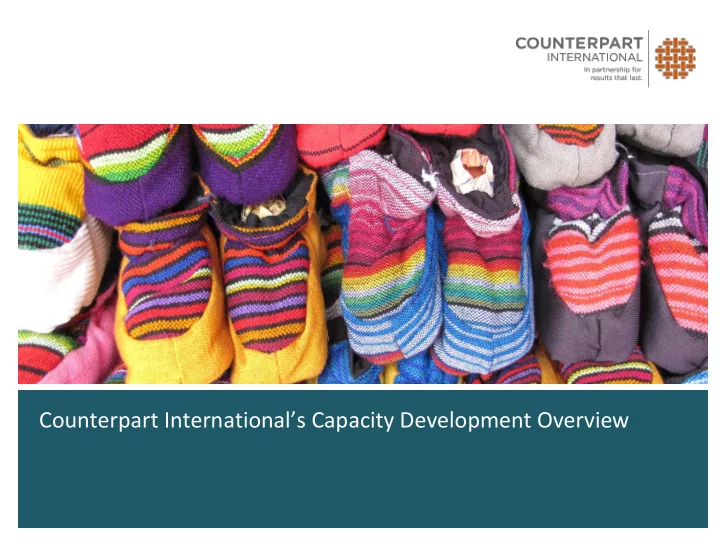

Counterpart International’s Capacity Development Overview
The Counterpart Way - Approach Promoting local ownership of each development program to ensure its continued success long after our participation. Our strategy is supported by four main components: accountability; institution building; partnership development; and the ability to replicate and scale-up the project. 2
Evolution of an Approach Starting in South Pacific with Community and ■ Organizational Capacity Building (1965) NGO Service Center Model (1994) ■ National Networks of Civil Society Support Centers (1997) ■ Financial Sustainability and Cultivating Domestic Funding ■ Sources (2000) Continuation of Cascading CSO Service Networks via ISOs ■ and CSSCs (2005) Demand-driven co-creation of innovative approaches ■ (2015) 3
Afghanistan legacy (2005 – ongoing) 3 Programs that have built on: - civil society engagement with government increasing CSO thematic expertise in democracy and - governance expanding civic engagement; - improving access to independent news and public affairs - information and strengthening CSO organizational capacity. - 4
Innovation for Change (I4C) was established as a response to widespread and worsening trends affecting civil society, including increasing restrictions on civic space and attacks on civil society organizations. I4C is a global network of people and organizations who want to connect, partner and learn together to defend and strengthen civic space and overcome restrictions to our basic freedoms of assembly, association, and speech. 5
Lessons Learned and New Directions in Counterpart LCD A systems approach to organizations is a strong foundation ■ but understanding the parameters of the enabling environment is equally important as their existence Trainings serve as a solid basis for introducing new ■ concepts and tools, but follow-up consultations and coaching are critical Identifying the right tools & approaches and continuous ■ adapting them to better align to the changing environment and individualized organizational needs Local buy-in – if an organization does not buy into the ■ process the CSOs ability to improve is limited Understanding cross-cutting areas that NGOs play a critical ■ role 6
Recommend
More recommend